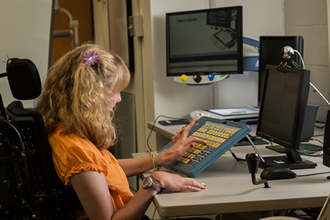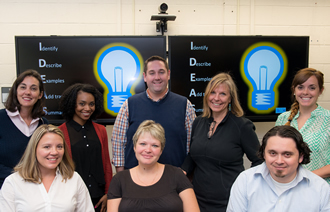Research Projects
The Kellar Institute for Human DisAbilities (KIHd) continues to build and support numerous educational research projects that vary across disciplines spearheaded by the Mason faculty members. Our goal is to increase evidence based instructional and behavioral strategies to improve academic outcomes for all students with disabilities.
Project Explore
The purpose of this project is to explore relationships between teachers' use of evidence-based practices, teachers' experience with and attitudes about adapting instruction for students with disabilities, and students' writing outcomes.
Findings from this research will provide preliminary information about how writing is integrated within inclusive middle school science and social studies.
SE Faculty Seed Grants
Every year CEHD supports new or emerging interdisciplinary research projects through the seed grant initiative. Here is a list of CEHD seed grants for 2017-2018 with Special Education faculties.
Project WEGO-RIITE
WEGO-RIITE: Writing Efficiently with Graphic Organizers - Responsive Instruction while Implementing Technology Efficiently is funded by the Stepping-Up Technology Implementation program, Office of Special Education Programs, U.S. Department of Education. It aims to improve persuasive essay writing for struggling writers with and without disabilities as well as to support data-driven decision making in writing instruction. Contact Dr. Anya Evmenova for more information.
CSforALL
Computer Science for All (CSforALL) is a project funded by the National Science Foundation. It focuses on preparing K-5 teachers to integrate the computer science standards of learning in inclusive classrooms to support students with high incidence disabilities. Collaboration between faculty from George Mason University, Old Dominion University, non-profit group CodeVA, and Norfolk City Public Schools aims to broaden computer science curriculum based on the principles of Universal Design for Learning (UDL) in Virginia. Contact Dr. Anya Evmenova for more information.
Wearable Technology
Assistive Wearables to Support Self-Regulation for Neurodiverse Postsecondary Students is a Disability and Rehabilitation Research Projects (DRRP) funded by the National Institute on Disability, Independent Living, and Rehabilitation Research (NIDILRR). It aims to develop a wearable technology application to support young adults with intellectual disabilities in regulating their emotions across different environments (academic, employment, independent living). Contact Dr. Anya Evmenova for more information.
DEPICT CS
The Partnership to Implement the Inclusive Computer Science Model of Professional Development is a project funded by the National Science Foundation. It is a partnership with Fairfax County Public Schools to integrate computer science and computational thinking into grades PK-6 using a researcher-developed digital tool called the Digital Effective Platform for Computational Thinking and Computer Science (DECPICT-CS). Contact Dr. Anya Evmenova for more information.
Be Ready, Be Well
Be Ready, Be Well (BRBW) is a well-being transition program for young adults with disabilities and their families, which focuses on self-advocacy, active listening, and stress management strategies. Contact Dr. Jodi Duke, Dr. Grace Francis, and Dr. Alexandra Raines for more information.
Mobile Apps
Helen A. Kellar Institute faculty and staff embrace new technologies as they emerge and make every effort to make content accessible across a range of different formats and devices. Our app development team is in the process of launching several new apps for people with disabilities, service providers and professionals working in the field of special education.





